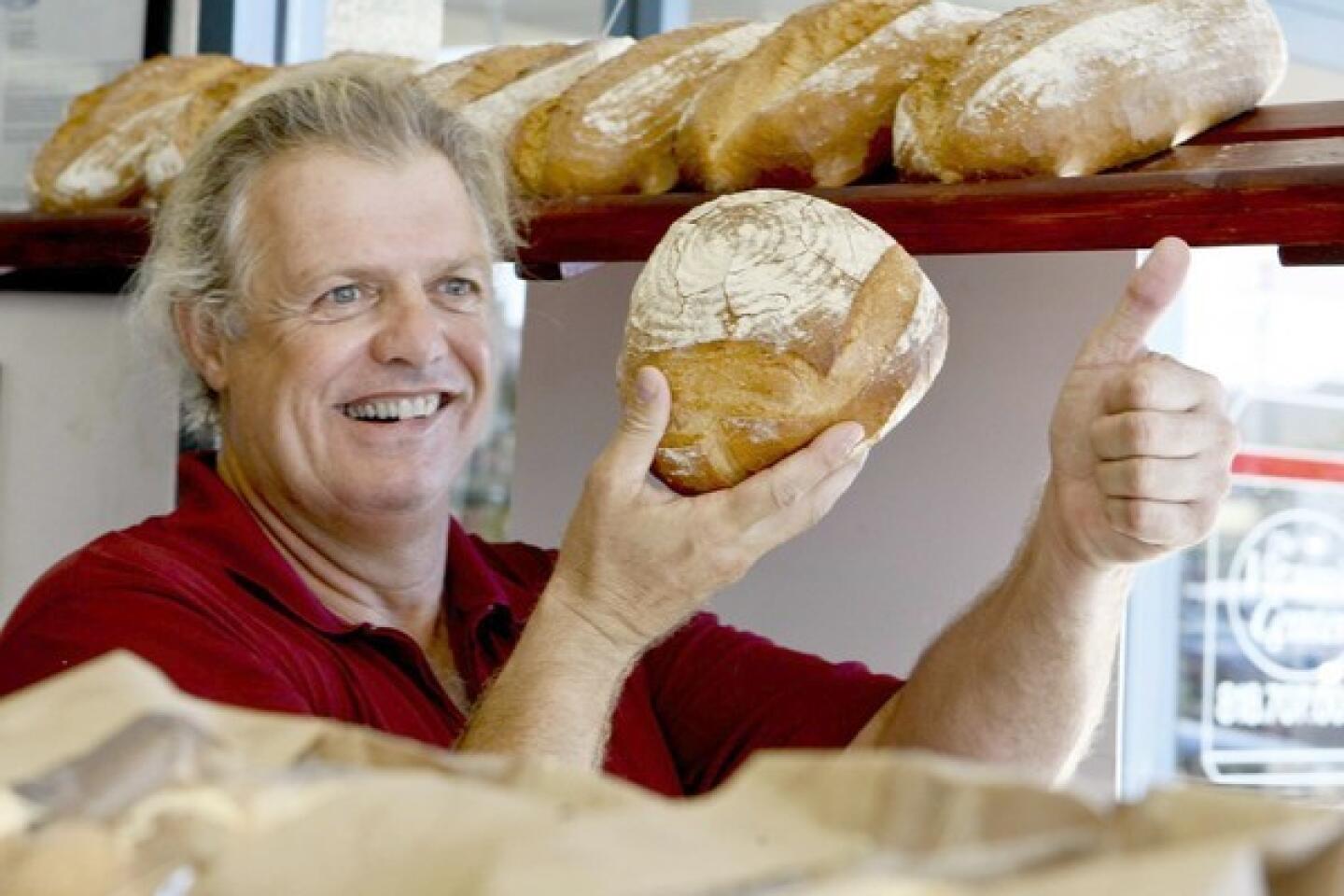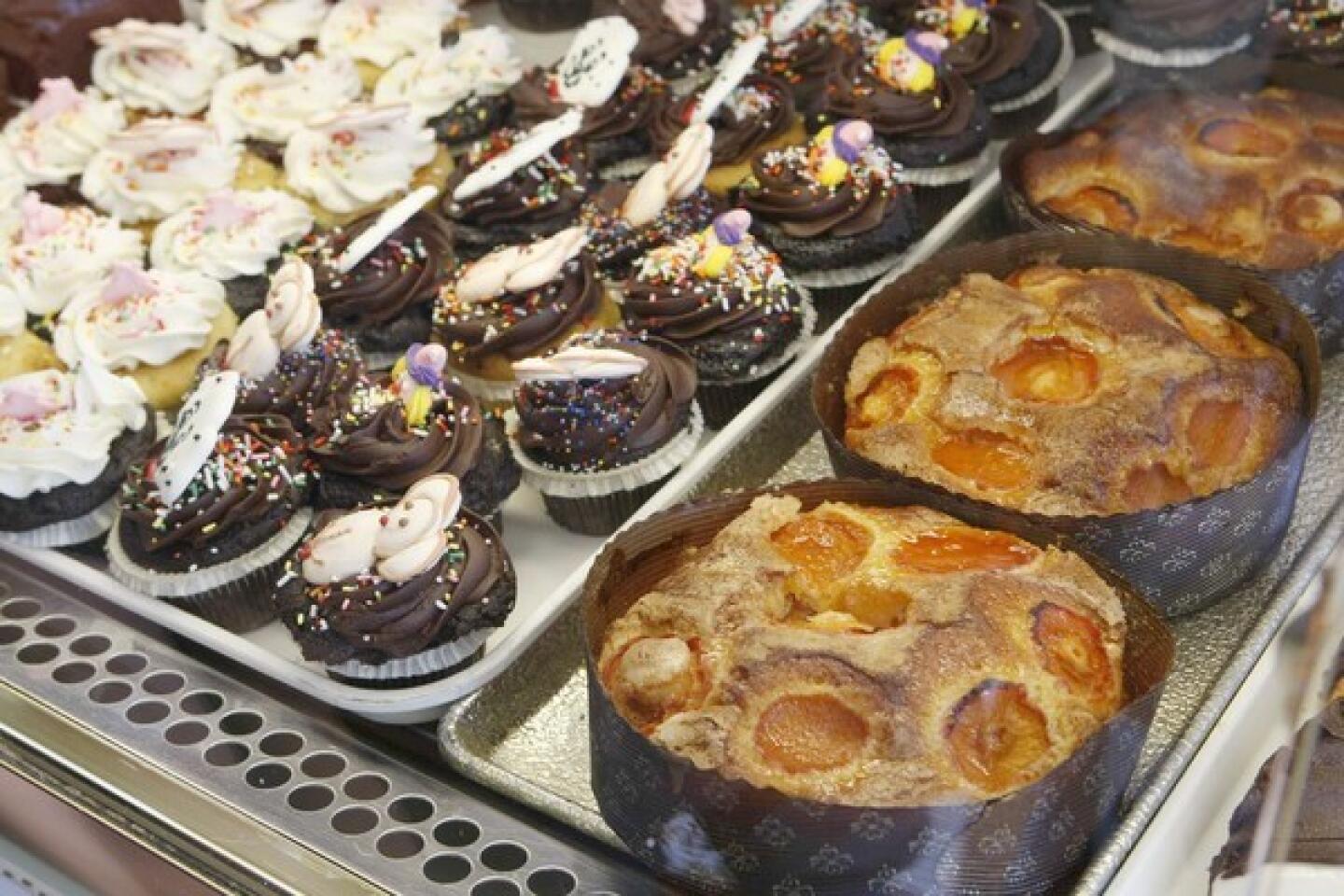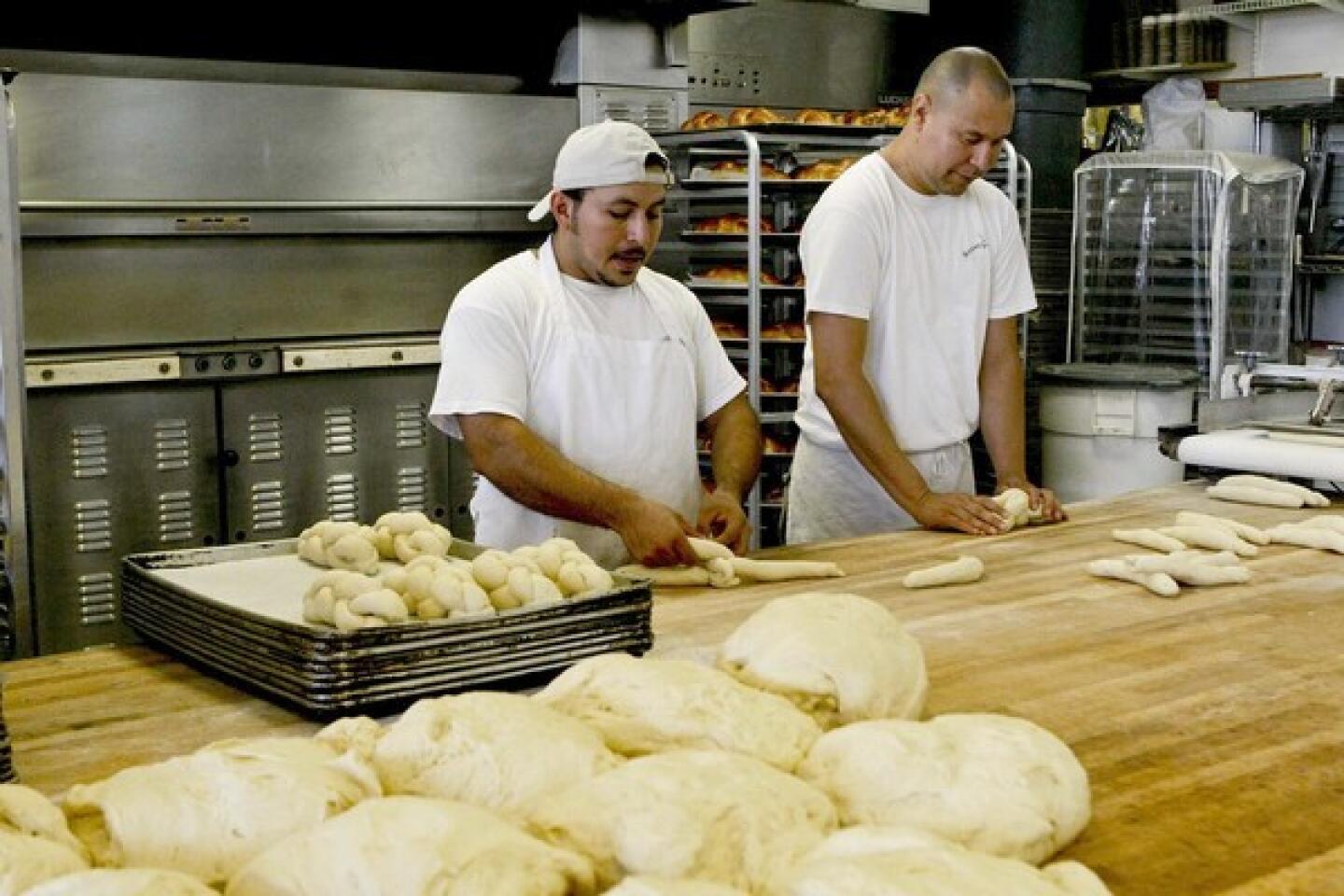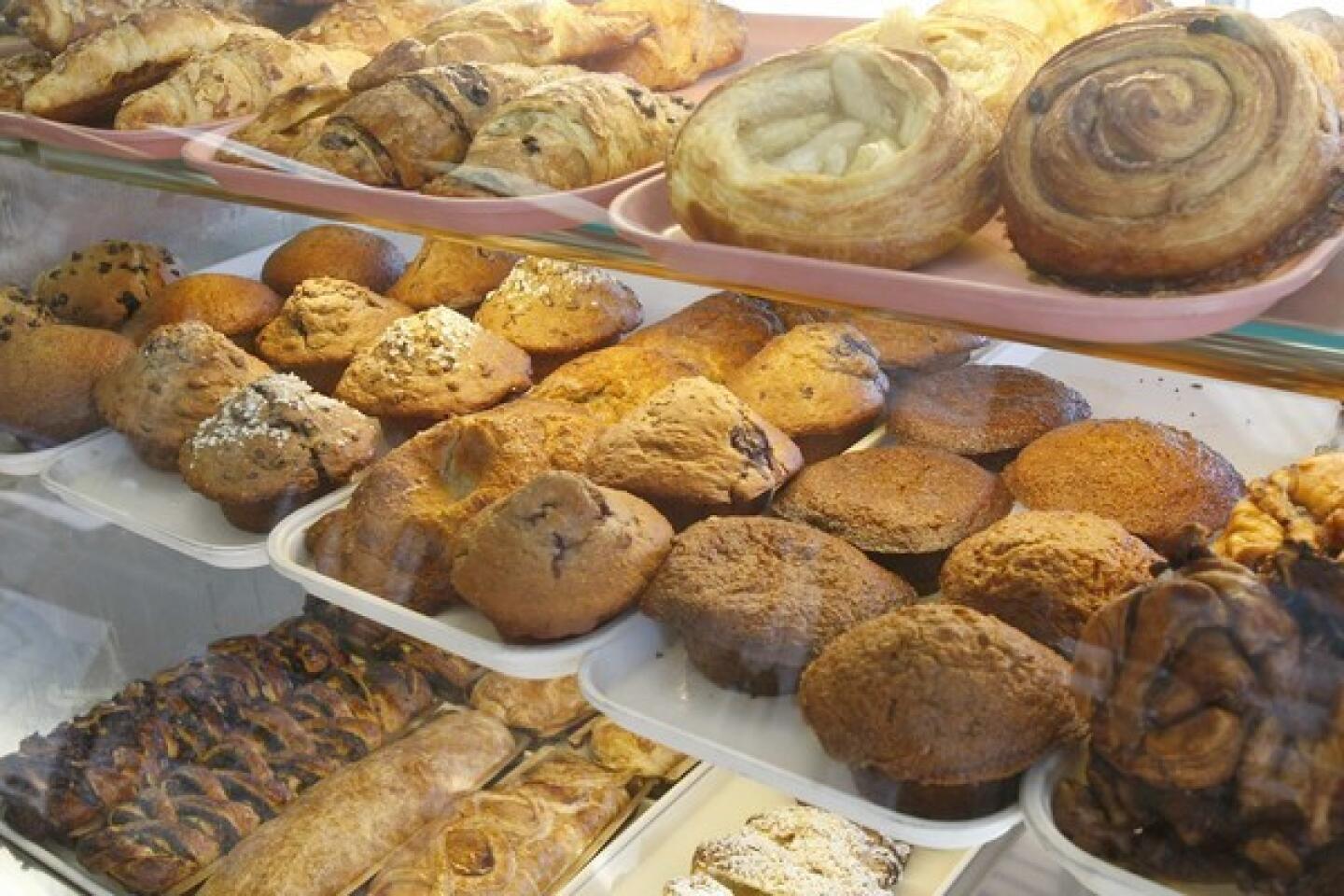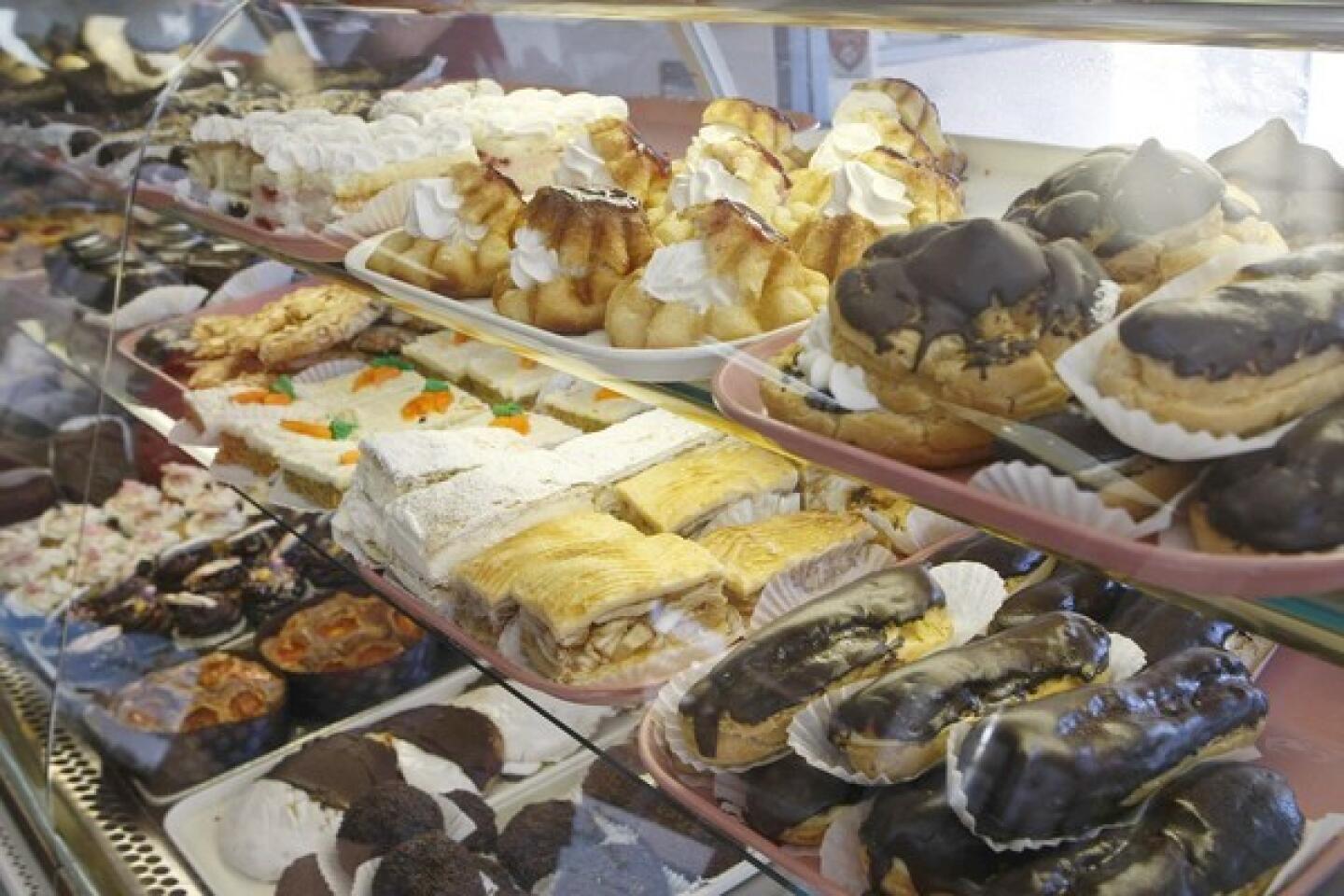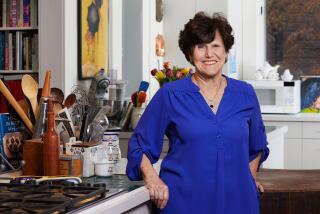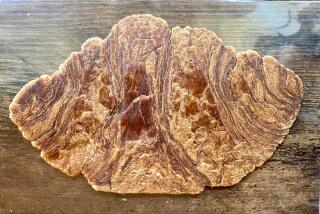The Artisan: StoneGround Bakery in Agoura Hills
In the weeks leading up to Rosh Hashana, Abby Franke and his team of bakers at StoneGround Bakery are braiding thousands of egg-and-honey-rich challah loaves by hand. The breads are kosher, as are the hundreds of other Jewish-German products in the Agoura Hills bakery’s lineup.
Only the 52-year-old baker isn’t Jewish. Franke and his staff are baking those loaves in honor of his friend and former baking partner, Paul Sherman.
The chatty, ponytail-sporting Franke, who comes from Hagen, Germany, readily admits he prefers the rustic whole grain crusty loaves he made while earning his baking meisterbrief (Germany’s rigorous seven-year, guild-regulated certificate program for artisan crafts). And that initially he wasn’t that crazy about the guy who became his business partner either.
“I didn’t like him at first,” says Franke, dodging sheet pans of chubby challah dough in the bakery’s cramped kitchen. “He was a little too shy for me.” Sherman, who died two years ago, was a reserved Jewish baker from Tel Aviv who operated the Sherman Oaks-based Sherman Bakery in the ‘80s and ‘90s — a kosher bakery with its shelves piled high with challah.
But eventually they hit it off. “We realized we really weren’t all that different,” Franke says. “We both specialized in bread.”
For these first-generation Americans, that unwavering commitment to cultural heritage — Sherman wouldn’t budge on the kosher front, Franke insisted that the bakery grind its own flour for crusty European-style loaves — is the reason they eventually connected. But it was Sherman’s traditional Jewish bread and pastry recipes that would become the backbone of StoneGround Bakery’s success during those early years.
Today, Franke keeps his friend’s baking traditions alive (he refuses to buy a challah-braiding machine or bow to grocery store demands for frozen loaves) as much out of respect for a fellow master baker as for his own baking beliefs.
“What I didn’t know about [kosher] baking, Paul taught me, and vice versa,” says Franke, formerly a production manager at La Brea Bakery, as he breaks open a golden-brown loaf to reveal the pillowy interior.
Franke credits not the ingredients but Sherman’s challah-making technique as the reason for their pull-apart bread success (he proofs the bread for two days in the refrigerator prior to baking). “Actually, our recipes were almost identical for rye bread, baguettes, macaroons, pretty much everything,” says Franke, adding that a twisted egg and honey Easter bread similar to challah goes by the name osterzopf in Germany.
At Sherman’s insistence, all of the baked goods at StoneGround are not only kosher (for baked goods, that means no contact with nonkosher meat products, such as lard), but also pareve, or “neutral” (no milk or dairy products) so observant Jews can eat them with meat and dairy dishes.
Those restrictions might have been a way of life for Sherman, but for Franke they meant major changes — no butter in the vanillekipferl (German crescent-shaped almond cookies) and apple strudel he had been baking for decades. “Would they taste different with butter?” asks Franke, nodding toward the dozens of German pastries alongside the traditional Jewish-style desserts, such as honey cakes and babka, lining the retail bakery cases. “Maybe, but that’s not what Paul and I decided to do here.”
Sherman’s challah soon became the bakery’s signature product. Today, StoneGround Bakery produces several variations, some plain, some sprinkled with sesame seeds, others plumped with raisins and chocolate chips. Round, unbraided holiday versions (symbolizing the cycle of life), make brief appearances in the weeks surrounding Rosh Hashana.
As with his late friend’s pareve commitment, using freshly ground whole-wheat flour for the bakery’s rustic loaves has always been crucial to Franke. “The flours here [in the U.S.] don’t taste as good as the aged flours you can get in Germany, so I had to make my own,” he says, patting the waist-high, 40-year-old burr mill hidden in an oversized closet.
Freshly milled flour is known in the milling industry as green or “unaged” flour (a reference not to the color but to undeveloped gluten in freshly milled flour). Franke says flour must be “aged” for several days or even weeks to strengthen the gluten that comes from the flour so that breads proof properly. “If you use flour you just milled, the bread will be dense, and not the best flavor,” he explains over the loud hum of the stone grinding plates. “But a lot of commercial flour you buy is aged unnaturally with chemicals that don’t taste good either.”
In Franke’s ideal weissbrot (German whole wheat bread) world, all bakers would dedicate a portion of their kitchens to a grain mill. “If you grind flour yourself, you can control quality — taste, crust, the whole thing,” he says. Each week, the bakery goes through nearly a thousand pounds of wheat kernels shipped in from farms in Montana and Canada (Franke buys white, pumpernickel and other flours for his breads and pastries to supplement the freshly ground wheat).
As a small bakery, StoneGround doesn’t have the storage space for large shipments of whole wheat kernels and flour, so Franke pays substantially more for regular small shipments. But he says saving a few pennies isn’t the point.
“This is why Paul and I opened the bakery, to do things by hand this way,” he says, standing in the middle of a kitchen filled with dozens of baker’s racks loaded with challah, hand-dipped chocolate macaroons and honey-whole wheat sandwich bread on its way to grocery chains, temples and local schools ( Ventura County schools use the stone-ground wheat bread for sandwiches). “I’m not going to change just because we’ve grown.”
Still, Franke admits he wouldn’t mind a little more space. He’s currently scouting for a second bakery location where he can store more flour, buy a larger grain mill and maybe — if he’s lucky — add a wood-burning oven for his beloved rustic (and now kosher) bread.
In the meantime, he’s managed to squeeze a few extra feet out of the strip-mall bake shop by pushing the kitchen farther into the retail space up front, where piles of Sherman’s challah and coconut macaroons are snuggly packed beside his Bavarian pretzels and pumpernickel loaves.
“I can’t believe how much we’ve done with our little bakery,” he says, still astounded by his success.
Barely six years after the unorthodox pair opened their bakery with little more than a home equity loan, StoneGround has a staff of more than 20 employees who churn out millions of handmade breads and pastries each year.
“I just wish Paul could see all of this,” Franke says. “We were just starting to take off when he died.”
food@latimes.com
More to Read
Eat your way across L.A.
Get our weekly Tasting Notes newsletter for reviews, news and more.
You may occasionally receive promotional content from the Los Angeles Times.
